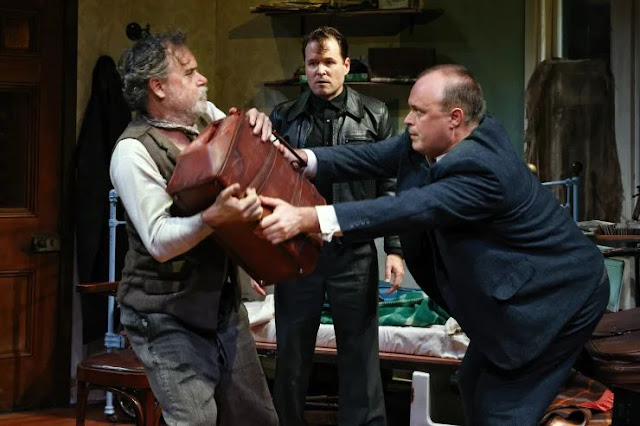The Caretaker by Harold Pinter. Ensemble Theatre, Sydney, October 14 – November 19 2022.
Reviewed by Frank McKone
October 22, 3.30pm
Cast:
Darren Gilshenan – Davies; Anthony Gooley – Aston; Henry Nixon – Mick
Understudies: Laurence Coy; Tim Walter
Creatives:
Director – Iain Sinclair; Assistant Director – Danielle Maas
Set & Costume Designer – Veronique Benett
Lighting Designer – Matt Cox; Sound Designer – Daryl Wallis
Stage Manager – Lauren Tulloh; Costume Supervisor – Renata Beslik
Dialect Coach – Linda Nicholls-Gidley; Combat Director – Scott Witt
Mick, a man in his late twenties; Aston, a man in his early thirties; Davies, an old man
____________________________________________________________________
Kirribilli Village – multi-multicultural, just below Sydney Harbour Bridge – having coffee before the afternoon show, at the Bakery, near the Japanese, Thai and Italian restaurants, not far from the Indian restaurant for dinner; a world away in time and distance from Harold Pinter’s London of my childhood in the 1950s.
I’m sure like many of the people around me of migrant origin, I am more than grateful for my sense of freedom in Australia – even though only from the English class system which I fear would have held me back in my working class culture. Like Aston, the elder brother in The Caretaker, my mental confusion might have led to electroconvulsive shock treatment:
https://en.wikipedia.org/wiki/History_of_electroconvulsive_therapy_in_the_United_Kingdom
while we are seeing the Eton / Oxford upper class culture play out in the Conservative Party political disaster in the UK right now.
You might have thought the sound of rain on the roof of the Ensemble Theatre, and the drips into the bucket hanging from the ceiling were real, but ‘I can tell you’ (a favourite phrase from the old Cockney, Davies) that the rain of three La Ninas in Sydney is nothing like London’s drizzle. From October 1952 until well after Easter 1953 I never saw the sun and had to walk home from school unable to see my own feet because of the smog – which killed my grandma that Easter. I understood those drips, despite laughing along.
The terrific creation by all three actors, led by Darren Gilshenan in one of, arguably his best performance, of that Cockney culture was a delight for me. It has a long literary history. The language and the ironic, often deliberately politically incorrect humour, is there in the Gravedigger in Hamlet and the Porter in Macbeth, so the connection through my maternal grandfather, who was born ‘within the sound of Bow Bells’ which rang to introduce each scene (and could also have been Big Ben) took me right back to Shakespeare.
And, of course, Davies’ disgust at the dirty ‘blacks’ next door and the ‘Poles’, as the Commonwealth people with British citizenship immigrated and the beginning of Britain’s connection with what became the European Union was under way, has now created that other disaster, Brexit. Ironically today, Davies would never have read the works of the “Polish-British” writer (as I had always known him) Joseph Conrad [https://en.wikipedia.org › wiki › Joseph_Conrad] who was actually born in 1857 in Berdychiv, Ukraine [https://www.britannica.com › ... › Novelists A-K].
So I must give special thanks to Ensemble Theatre and the one-time Canberran ANU Theatre Arts student, Iain Sinclair, for a stunning presentation of Harold Pinter’s The Caretaker. Pinter became famous for his ‘pause’, the moments when nothing happened, in silence, while the characters react internally and work out what, if anything, they might let themselves say next.
In his Director’s Note, Sinclair writes:
Aston: Where were you born then?
Davies: (Darkly) What do you mean?
Max Stafford Clark who ran The Royal Court Theatre in UK taught me the most important lesson I have ever learned in directing and he used the above two lines from The Caretaker to do so.
Sinclair’s direction, though, also has about it the physicality for which Australian theatre has become legendary. Just watch for the ‘rugby league’ football training scene using the bag of second-hand clothing the kindly-hearted Aston has bought for the down-and-out Davies, thoroughly against his younger brother’s wish to kick Davies out. Nothing was said for at least five minutes – but everything was meant in the frantic hand-passing of the bag.
Particularly because Mack Davies himself often plays for laughs (his ‘papers’, entirely fictional of course, are held at Sidcup: The Sidcup in The Caretaker comes from the fact that the Royal Artillery HQ was there when I was a National Serviceman and its almost mythical quality as the fount of all permission and record was a source. " To English ears," Billington continues, "Sidcup has faintly comic overtones of suburban respectability." https://en.wikipedia.org › wiki › The_Caretaker), the play is often funny, but Sinclair, Gilshenan, Gooley and Nixon have accurately captured the absurdity of the play, and of life as Pinter saw it in 1960.
Is the play, and its production in Sydney in 2022, still relevant without knowing about Shepherd’s Bush and Finsbury Park, or Tottenham Court Road?
Yes, because in the end, though nowadays it will seem out of place with no female (or diverse) characters, it is essentially about what is universal: what does it mean to be a caretaker? Is it enough to take care of oneself, without regard for others? Is it possible, and how do you do it, to take care of someone else? Should not we all be caretakers in attitude towards everyone, however different from each other and from ourselves? Towards the environment, even?
With care, our world may be a better place. That’s the legacy Harold Pinter’s artistry passes on to us, today. Davies not only says “What do you mean?”, but also “Know what I mean!” Now we know and are thankful.
 |
| L-R: Darren Gilshenan as Davies, Henry Nixon as Mick, Anthony Gooley as Aston in The Caretaker by Harold Pinter Ensemble Theatre Photo: Prudence Upton |
